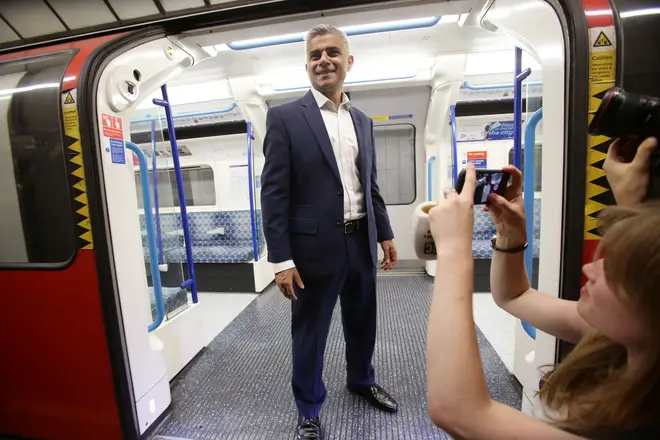
Oli Dugmore 4am - 7am
22 July 2020, 06:21 | Updated: 22 July 2020, 06:43

The London mayor, Sadiq Khan, has launched an independent review of Transport for London’s future funding and finances, in the wake of a central Government review.
The review is the latest move in a row between the Mayor's office and Downing Street over the £1.6bn bailout TfL received during the coronavirus lockdown.
The capital's transport network was previously forced to bring in fare increases and limits to free travel as part of the conditions to securing the Government rescue package.
The deal, which was agreed in mid-May, consisted of £1.1 billion grant and a £505 million loan which came after passenger numbers dropped by 90 per cent at the peak of the crisis.
Sadiq Khan and transport bosses were forced to agree to a central Government review of TfL's future financial position and financial structure led by international accountancy firm KPMG.
The announcement by City Hall comes amid accusations that Boris Johnson’s is seeking to deprive the Mayor of his powers while seeking to blame him for the impact on TfL’s finances by the coronavirus crisis.

Sadiq Khan brands Government "outrageous" for offering TfL a bad deal during a crisis
The review is intended to identify short and medium-term savings and reforms and establish the terms of further short-term grant funding.
But now Mr Khan has launched a separate review led by a panel of independent, unpaid experts in public policy and the reform of public bodies.
He said the purpose of the new panel was to look beyond the scope of the Government's review to identify strategies for "long-term sustained funding" for the transport network.
Since 2018, TfL has been operating without any additional Government grants.
The decision to scrap TfL's operating grant was made in 2015 when Boris Johnson was London's mayor.
Its loss was the equivalent to a cut of £700 million per year between 2018 and 2023, according to City Hall.
Despite the loss, TfL had previously boasted of its progress in reducing its operating deficit while still continuing its programme of upgrades to the network.
At the beginning of March 2020, it estimated it would reduce its like-for-like operating deficit by 86 per cent by the end of the 2019/20 financial year compared to 2015/16.
But, as 70 per cent of its income is generated by fares, the coronavirus shutdown had a devastating effect on TfL's finances.
Mr Khan said: "Despite the huge strides made in reducing TfL's operating deficit over the past few years, it is clearer than ever that the current funding structure is not fit for purpose.
"It is vital that we find a new solution to support not only London but the wider economy, so I am really pleased that an independent panel of experts will review TfL's long term funding and financing options."
Andy Byford, London's Transport Commissioner, said: "Prudent financial management had placed TfL on the cusp of breaking even for the first time in its history and with strong financial reserves.
"However, the pandemic has revealed that the current funding model, with its heavy reliance on fare revenue, simply doesn't work when faced with such a shock.
"This important review will examine the options for new and more robust arrangements to provide firmer foundations into the future."
The panel membership is:
- TC Chew, global rail business leader at engineering firm Arup and fellow of the Royal Academy of Engineering.
- Stephen Glaister CBE, emeritus professor of transport and infrastructure at Imperial College London.
- Bridget Rosewell CBE, chair of the M6 Toll company and a commissioner for the National Infrastructure Commission.
- Sir Jonathan Taylor, vice president of the European Investment Bank from 2013 until 2019.
The independent panel is due to conclude its work in September.